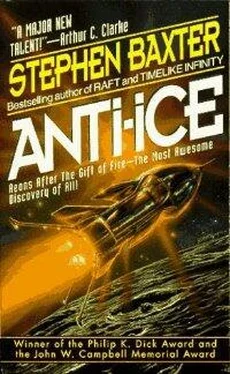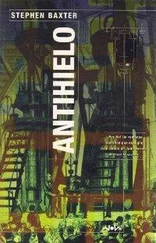Stephen Baxter - Anti-Ice
Здесь есть возможность читать онлайн «Stephen Baxter - Anti-Ice» весь текст электронной книги совершенно бесплатно (целиком полную версию без сокращений). В некоторых случаях можно слушать аудио, скачать через торрент в формате fb2 и присутствует краткое содержание. Год выпуска: 1993, ISBN: 1993, Издательство: Collins, Жанр: Фантастика и фэнтези, на английском языке. Описание произведения, (предисловие) а так же отзывы посетителей доступны на портале библиотеки ЛибКат.
- Название:Anti-Ice
- Автор:
- Издательство:Collins
- Жанр:
- Год:1993
- ISBN:978-0-246-13835-4
- Рейтинг книги:5 / 5. Голосов: 1
-
Избранное:Добавить в избранное
- Отзывы:
-
Ваша оценка:
- 100
- 1
- 2
- 3
- 4
- 5
Anti-Ice: краткое содержание, описание и аннотация
Предлагаем к чтению аннотацию, описание, краткое содержание или предисловие (зависит от того, что написал сам автор книги «Anti-Ice»). Если вы не нашли необходимую информацию о книге — напишите в комментариях, мы постараемся отыскать её.
Anti-Ice — читать онлайн бесплатно полную книгу (весь текст) целиком
Ниже представлен текст книги, разбитый по страницам. Система сохранения места последней прочитанной страницы, позволяет с удобством читать онлайн бесплатно книгу «Anti-Ice», без необходимости каждый раз заново искать на чём Вы остановились. Поставьте закладку, и сможете в любой момент перейти на страницу, на которой закончили чтение.
Интервал:
Закладка:
Inside the cavity was a single shell, of size about ten pounds. This the engineer lifted as delicately as if it were a child and placed it gently in the muzzle of the artillery piece. Then Traveller stood back.
The gun fired, with a muffled explosion like a cough. Within seconds that single, precious shell was arcing above my head, bearing a few ounces of anti-ice to Sebastopol.
From my position I could not see the town itself, but still I peered over the heads of my colleagues in anticipation as that shell made for the battered fortress; I even pushed back my cap and peaked my hand over my eyes, the better to see.
I have since learned something of the properties of that strange substance anti-ice, Father. It is mined from a strange seam in the frozen ocean of the South Pole, and as long as it is maintained at those frosty temperatures it is perfectly safe. Once it is heated, however—
Well, let me describe to you what I saw.
The shell shriek fell away.
Then it was as if the Sun had touched the Earth.
The horizon in the direction of Sebastopol exploded into a silent sea of light. It was a light that tore into the skin, so that one could feel the very blisters as they rose. I staggered back, my cries of shock and horror joining those of my companions. I dropped my hand from my forehead and stared at it; scorched and blistering, the hand was like a grotesque waxwork, not part of my body at all. Then the pain reached my dull wits and I yelled; and as I did so I felt my scorched cheeks crack and ooze, and I soon shut up. But, Father, I soon learned that I had once more been undeservedly fortunate; for my hand had shielded my sight from the worst of that shock of light, while all around me fellows had crumpled to the soil, pressing their burnt eyes. Then—only a few seconds after that great optical concussion—there came a wind like the breath of God. I was bowled over backwards, and I tucked my blasted hand into my uniform to protect it; I clung to the ground amid a hail of dust and screamed into the wind.
The heat was astonishing.
Long minutes later that gale subsided, and I staggered to my feet. Men, burned and weeping—weapons—the remains of tents—terrified horses—all lay scattered over the ground like the toys of some capricious child-giant. Father, within less than a quarter-hour our camp had been devastated to a far greater extent than either the Russians, Dame Cholera, or Generals January and February had managed hitherto.
Meanwhile, over Sebastopol, a cloud shaped like a black hammer rose into the air.
A fellow beside me lay weeping, his eyes pools of cloudy liquid—horribly like the eyes of a boiled trout. For the next minutes I crouched by him and grasped his hand, mutely offering what comfort I could. Then an Officer came by—his uniform was scorched and unrecognizable, but the remains of a sword still swung at his hip—and I called up to him. “What have they done to us, your honor? Is this some devilish new weapon of the Cossacks?”
He paused and looked down at me. He was a young man, but that infernal light had blasted lines of age into his face; and he said: “No, lad, not the Cossacks; that was one of our own.”
At first I could not understand him, but he pointed to the dispersing cloud over Sebastopol, and I came to see the astonishing truth: that the engineer’s single shell, impacting Sebastopol, had caused an explosion of such severity that even we—at a distance of three miles—had been incapacitated.
Clearly the power of the novel projectile had been grossly underestimated; otherwise surely we would have been confined to our trenches and foxholes.
Slowly I became aware that the Russian guns, a constant chorus since my arrival on the Peninsula, were stilled at last. Had we then achieved our main objective? With this one, single, devastating blow, was Sebastopol laid low?
A trace of exultation, of victory, coursed through my veins; but my own pain, the devastation around me, and that looming thunderhead over Sebastopol, all worked rapidly to subdue me; and from those left standing near me I heard not a word of rejoicing.
It was still only seven-thirty.
The Officers organized us quickly. Those of us reasonably able-bodied—which included me, Father, once my poor hand was salved, bandaged up and wrapped in a thick mitten—were put to work aiding the rest. We erected our tents once more and restored the camp into something resembling a British military operation.
Then the lines of hospital carts began to form.
So we were occupied until noon, by which time the sun was high overhead. I sat in the shade, salt sweat coursing into my burns, and ate Bully Beef and sipped water through cracked lips.
Though the thunderhead was cleared now, there was still not a sound from the Russian guns in Sebastopol.
At about two of the afternoon we were ordered to form up for the final assault. But, Father, a strange assault it was going to be: we carried our Minies and ammo, yes; but also we hauled trench shovels, picks and other tools, and we loaded up carts with all the blankets, bandages, medication, water we could spare.
And so we set off over the last three miles to Sebastopol.
It took two hours, I would guess. After ten months of artillery bombardment and siege warfare the land was an ocean of churned, crusty mud; continually I slipped into shell pits, and before long all of us were soaked by foul-smelling, brackish water. And everywhere I came across the rubble of warfare: cracked shell casings, abandoned kit, the wreckage of artillery pieces… and one or two ornaments of a more grisly nature which, with respect, Father, I will forbear to describe.
But at last we reached Sebastopol; and I stood for some minutes on a rise overlooking the town.
Father, you will recall my earlier description of that town as it lay intact within its walls, which had bristled with weaponry. Well, now it was as if a great boot had stamped—I can think of no other way to describe it. A crater perhaps a quarter-mile wide lay plumb in the center of the city, close to the docks; and I could see how the gouged earth continued to steam, the rocks and slag glowing red hot. And around this crater was a great circle, where the houses and other buildings had been razed, quite neatly; one could see the outlines of their foundations, as if one were staring at a giant architect’s plan—although here and there a chimney stack or fragment of wall, scorched to blackness, clung defiantly to the vertical. Beyond that region of devastation the buildings appeared to have remained largely intact—but of windows and roof slates there was scarcely an example. And in several quarters of the town we saw great fires raging, apparently uncontrolled.
The stout defensive walls of the town were trails of rubble now, toppled outwards by the blast; the muzzles of wrecked artillery pieces pointed at random to the sky. And the redoubts lay shattered; Russians in their shapeless uniforms sprawled over the ruins of their guns.
Beyond this infernal landscape the bay lay glimmering blue, quite unperturbed; but the corpses of several vessels lay adrift in the water, their masts snapped.
For some minutes we stared slack-mouthed. Then the Captain said, “Come on, lads; we have our duty to perform.”
We formed up once more. A bugle and drum struck up, their rousing sounds sharply misplaced, and we marched across the wreckage of the walls.
So, at last, at about four in the afternoon, the British Army entered Sebastopol.
At first we carried our weapons at battle ready and moved in good military order, with scouts and lookouts; but the only sound was the crunch of glass and smashed masonry under our boots, and it was as if we marched across the surface of the Moon. Even on the outskirts of town the buildings were uniformly scorched and blackened, and I was reminded of that terrible heat which had blazed from the heart of the city. We came across one house which looked as if it had been sliced open, so that we could see within to the furnishings and decorations of its unfortunate occupants. Smashed vehicles of all sizes littered the streets, dead or injured horses trapped in their harnesses still.
Читать дальшеИнтервал:
Закладка:
Похожие книги на «Anti-Ice»
Представляем Вашему вниманию похожие книги на «Anti-Ice» списком для выбора. Мы отобрали схожую по названию и смыслу литературу в надежде предоставить читателям больше вариантов отыскать новые, интересные, ещё непрочитанные произведения.
Обсуждение, отзывы о книге «Anti-Ice» и просто собственные мнения читателей. Оставьте ваши комментарии, напишите, что Вы думаете о произведении, его смысле или главных героях. Укажите что конкретно понравилось, а что нет, и почему Вы так считаете.












